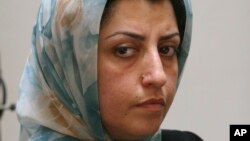
Jailed Iranian Nobel Peace Prize winner Narges Mohammadi faces a new trial over accusations she made against security forces of sexually assaulting female prisoners, her family said Saturday.
The trial, due to begin Sunday, relates to an audio message she shared from prison in April with supporters in which she decried a "full-scale war against women" in the Islamic Republic.
She is charged in this latest case with making "propaganda against the regime," the family said.
There has been no comment on the case by Iranian judicial authorities.
Her family quoted Mohammadi as saying that the trial should be held in public so "witnesses and survivors can testify to the sexual assaults perpetrated by the Islamic Republic regime against women."
Mohammadi, who is held in Tehran's Evin prison, urged Iranian women in her April message via her Instagram page to share their stories of arrest and sexual assault at the hands of the authorities.
She pointed to the case of journalist and student Dina Ghalibaf, who, according to rights groups, was arrested after accusing security forces on social media of handcuffing and sexually assaulting her during a previous arrest at a metro station. Ghalibaf was later released.
The authorities in Iran have in recent weeks intensified a crackdown obliging women to obey the country's Islamic dress code, notably making use of video surveillance.
Mohammadi has been incarcerated since November 2021 and has not seen her Paris-based husband and twin children for several years.
She said the trial that opens Sunday will be the fourth such case against her.
Mohammadi is already serving sentences based on several convictions issued in recent years, which her family says punish her for rights campaigning.
According to her family, her sentences now amount to 12 years and three months of imprisonment, 154 lashes, two years of exile and various social and political restrictions.
Mohammadi has long been a staunch opponent of the obligation for women in Iran to wear the headscarf and has continued her campaign even in prison, refusing to wear the hijab in front of male officials.







